Email encryption is a security measure for safeguarding the content of email messages from unauthorized access. It uses algorithms to encode the message, making it unreadable to anyone without the appropriate decryption key. Overall, email encryption ensures the privacy and security of sensitive information during transmission.
Since its inception, email encryption has served as an optional feature amid user interfaces. Now, choosing email encryption application programming interfaces (APIs) is by far the better option for businesses across industries.
How Email Encryption Works
Email encryption typically involves two main components — encryption and decryption.
When an email is sent, the sender’s email client or server encrypts the message using encryption algorithms, transforming it into ciphertext. This ciphertext is transmitted to the recipient. To decrypt the message, the recipient’s email client or server uses the decryption key to convert the cipher text back into plain text. This process ensures only authorized parties with the correct key can read the message.
There are two types of email encryption:
- Symmetric-key encryption: In this method, the same key is used to encrypt and decrypt the message.
- Public-key encryption: This approach uses both a public and a private key. The public key is transparent, and the private key is kept secret. The public key encrypts the message, while the private key decrypts the message.
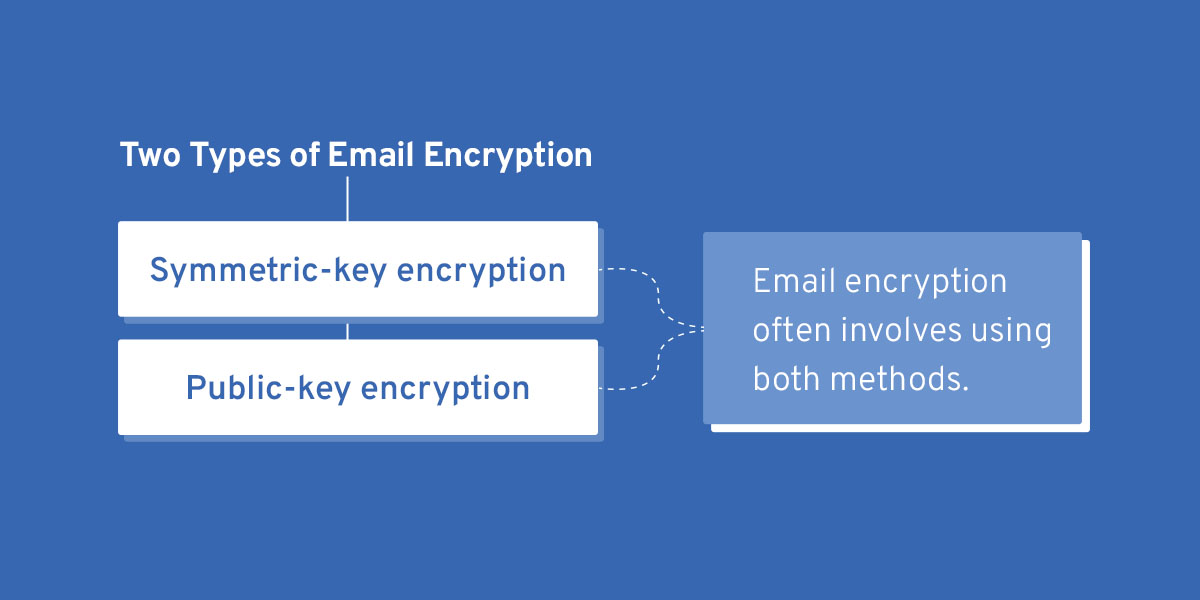
Email encryption often involves using both methods. For example, a user’s public key is used to encrypt a randomly generated symmetric key, which is used to encrypt the message.
The Transformation of Email Encryption
In the ever-evolving landscape of digital communication, email encryption has undergone a noteworthy transformation, shifting from being a standalone product to becoming an integrated feature within email platforms. Email encryption has long been an additional service that complements most email services and UIs — think of Microsoft Exchange and Outlook as prime examples. Virtually all email encryption solutions work with the Microsoft email server and client, even after it eventually migrated to the cloud as part of Office 365.
Microsoft introduced its own email encryption solution, Office Message Encryption, as an option and integrated feature of Office 365 in 2014. This feature has been improved since its introduction, and while it still has some limitations, it’s become a go-to solution for many users like HR and legal departments. Its compatibility, effectiveness and ease of use have made it a top choice, eliminating the need for additional specialized vendors (DataMotion included).
Additionally, major email service providers like Gmail have taken steps to make email encryption more accessible. They’ve implemented encryption techniques like TLS as a default option, enhancing the security of email traffic originating from their services. This approach represents a move toward making email encryption a standard feature rather than an optional, third-party overlay.
How Has Email Encryption Been Used as a Feature?
By integrating encryption into email platforms, sensitive information is shielded from prying eyes, ensuring only intended recipients can access the content. This safeguards sensitive data, like financial information, personal details and proprietary business communications.
Email encryption’s convenience factor can’t be overstated. As a feature, it streamlines the communication process. Users can enjoy an integrated security solution, simplifying their experience. This integration also reduces human error in implementing encryption, as it becomes an automatic part of the email system.
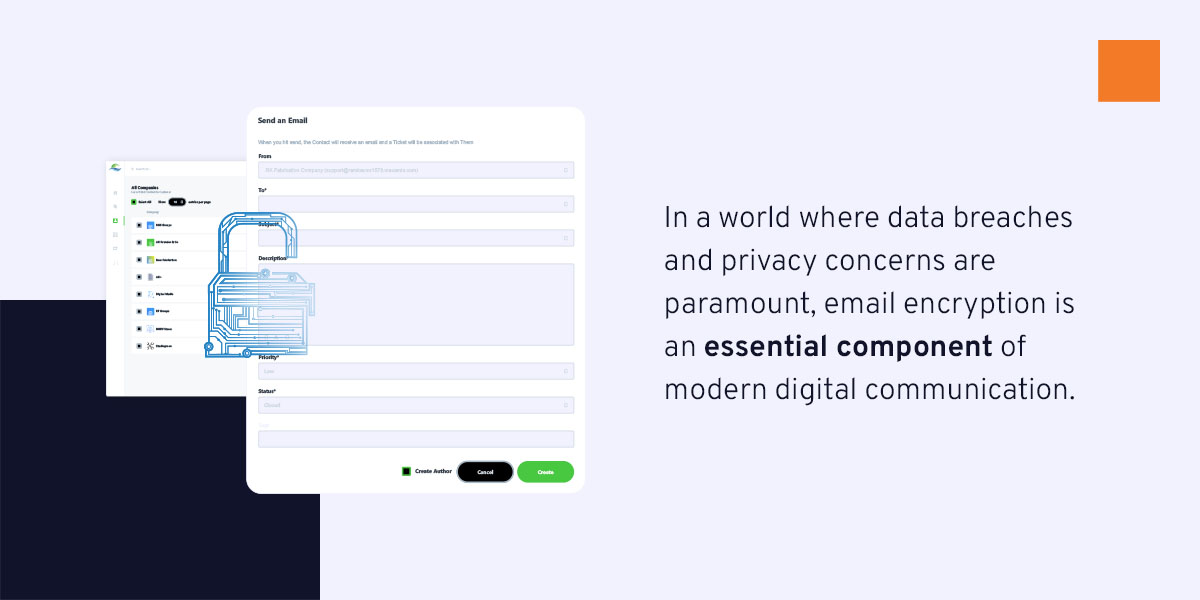
For organizations, this feature helps meet regulatory compliance requirements, a critical consideration across industries. It fosters trust among customers and partners, as they know their communications are secure. In a world where data breaches and privacy concerns are paramount, email encryption is an essential component of modern digital communication.
As noted, most email encryption solutions are already integrated well with Outlook and Exchange, which in effect makes them a plug-in toolbar button feature of Outlook, invoked with a click.
Email Encryption, CRM, Contact Centers and Mobile Apps
In fact, where email encryption matters most — in high-volume business processes handling regulated information — Outlook, or any webmail interface for that matter, is not the best place to send and receive messages and files.
CRMs, contact centers, practice management software, electronic health record systems, and custom database applications are the applications that often house the data and track the interactions with customers, partners or patients.
Shouldn’t email encryption be a standard feature of those solutions? For situations where the customer, client or patient needs to initiate an inquiry, shouldn’t a secure email channel be a feature easily accessible to them through customer-facing interfaces and apps such as websites, portals and mobile apps?
Enter Email Encryption as a Service
Email encryption application programming interfaces are tools that facilitate the integration of encryption functionality into email systems. They work by providing a set of functions or commands that developers can use to incorporate encryption features into their applications or email platforms. These APIs streamline the process, allowing for automated encryption and decryption, enhancing security and user experience.
While email encryption vendors can extend the existing Outlook style ‘plug-in’ model of creating applets to expose their email encryption services as a ‘toolbar button’ in popular CRM UI’s (Salesforce for instance), this approach doesn’t scale well, doesn’t always accommodate the use case at hand and doesn’t integrate into customer-facing services such as self-service portals or mobile apps. In these cases, a native solution is best, using web service email encryption APIs to provide secure messaging, file and form exchange to support high-volume applications with trusted security and verifiable compliance.
This application of email encryption APIs lends itself best to health care, financial services, insurance and government applications at enterprise scale. These organizations are best positioned to migrate off standalone email encryption solutions and leverage the benefits of email encryption as a feature through the use of APIs.
Benefits of Choosing an Email Encryption API
Email encryption is a critical component of modern communication. With technology advancing every day, organizations need a way to ensure the privacy and security of sensitive information exchanged through electronic mail.
When implementing email encryption, many businesses and developers are increasingly turning to APIs to enhance their email security. Approaching encryption as a service offers several significant benefits beyond the standard ones given by basic encryption features:
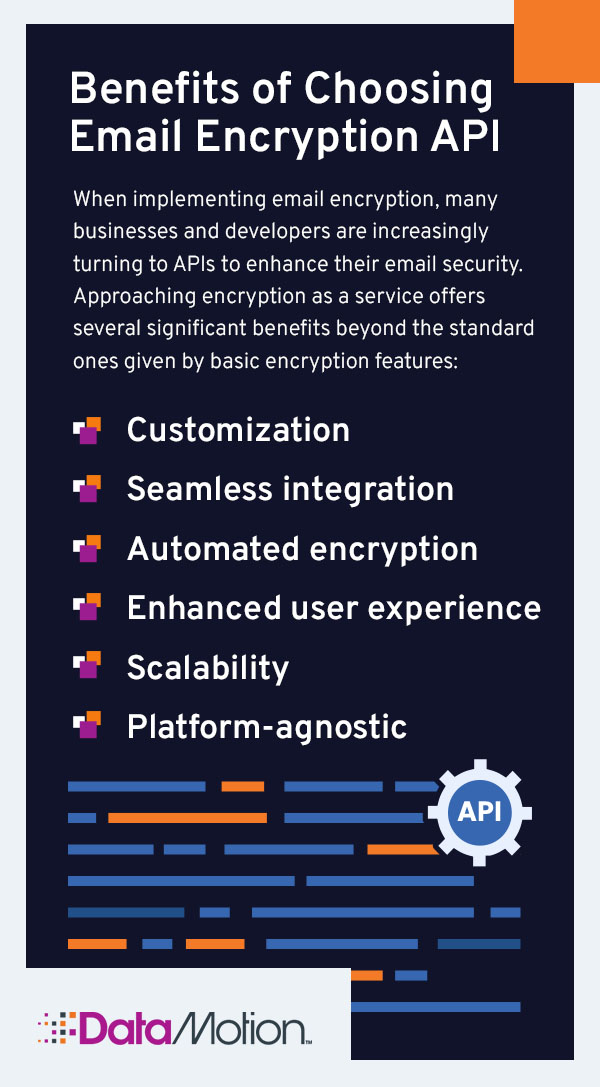
- Customization: Email encryption APIs provide the flexibility to tailor encryption solutions to specific needs. This customization is invaluable for businesses with unique security requirements or those operating in regulated industries. API integration allows you to create encryption protocols that align with specific compliance standards, providing peace of mind for senders and recipients.
- Seamless integration: APIs are designed to seamlessly integrate with existing email systems, making the adoption process straightforward and minimally disruptive. This means organizations don’t have to undergo significant overhauls of their current email infrastructure to complement robust encryption. This transition is smoother, reducing the learning curve for employees and minimizing potential workflow disruptions.
- Automated encryption: APIs can automate the encryption and decryption process, reducing the risk of human error. Automation is particularly valuable in high-volume environments where manual encryption could be time-consuming and error-prone. Automation ensures all outgoing emails containing sensitive information are consistently protected.
- Enhanced user experience: Email encryption APIs provide a more user-friendly experience. Recipients don’t need to install additional software or use separate decryption tools. This enhances the overall communication experience, fostering trust and cooperation among users who expect their sensitive information to be protected effortlessly.
- Scalability: As businesses grow, their email encryption needs may evolve. APIs offer scalability, allowing organizations to adapt to changing requirements. This means companies can easily accommodate increased email traffic and ensure that encryption remains a robust and effective security measure.
- Platform-agnostic: Email encryption APIs are platform-agnostic and can work with various email providers. This provides enhanced control with specialized encryption services.
Email Encryption APIs for Mid-Market Solution Providers
Email encryption APIs can benefit organizations outside of large enterprises. Integrating this feature into platforms across industries can deliver excellent security benefits.
Digital banking platforms, digital insurance platforms, electronic health record systems, chronic care management systems and practice management systems can all benefit from a robust, secure messaging and file exchange feature. Email encryption APIs provide an accessible way to send and receive messages and files through a toolbar feature within these applications’ UI, making it a versatile solution for a wide range of mid-market solution providers.
What to Look for in an Email Encryption API
When evaluating email encryption API options, you want to ensure your chosen solution meets your organization’s security and functionality needs. Here are some essential features to look for:
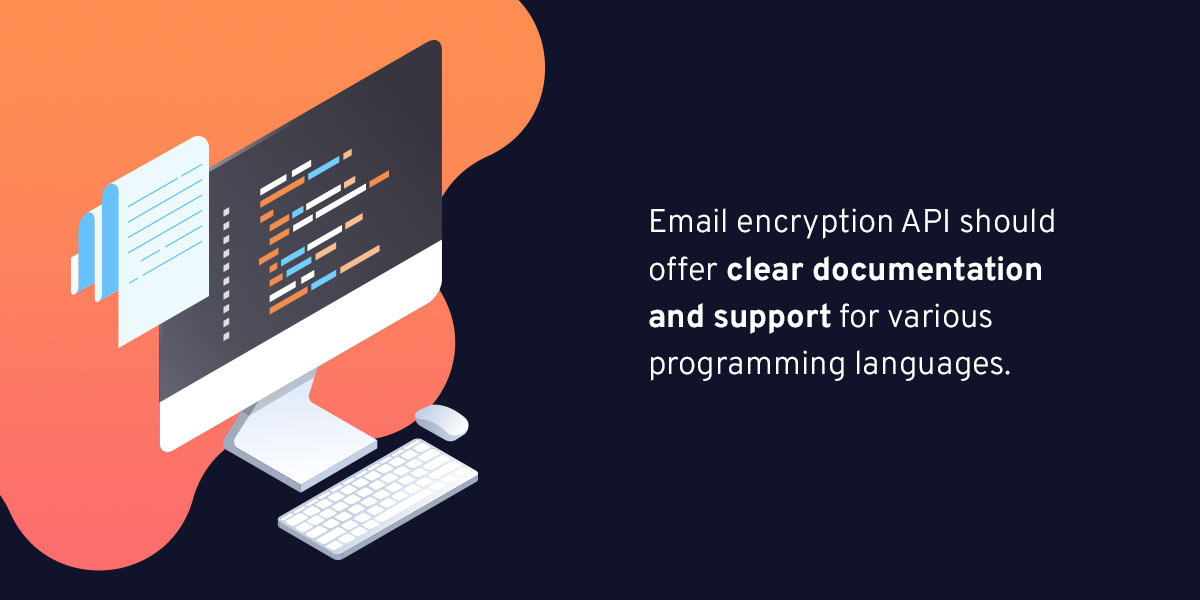
- Robust encryption algorithms: Ensure the API supports strong encryption algorithms, like AES and RSA, to provide comprehensive protection for email content.
- Ease of integration: Look for an API that is easy to integrate with your existing email system or application. It should offer clear documentation and support for various programming languages.
- Automated key management: Effective key management is essential. The API should provide tools for generating, storing and securely managing encryption keys. The ability to rotate keys regularly is also vital for long-term security.
- End-to-end encryption: The API should support end-to-end encryption, ensuring email content remains encrypted from the sender to the recipient, with decryption only happening at the recipient’s end.
- Compliance and certifications: Check if the API complies with industry regulations and standards. Look for certifications and audits that demonstrate its commitment to security and compliance.
- User-friendly experience: A user-friendly API is crucial, especially for email encryption in customer-facing applications. Consider features like a simple user interface, support for mobile devices and user-friendly error handling.
- Customization and scalability: You want the ability to customize encryption settings, key lengths and other security parameters. Additionally, ensure the API can handle your organization’s email volume, both current and future. It should be scalable to accommodate growth without sacrificing performance.
- Reporting and monitoring: Look into features that provide insights into email encryption activity, like message tracking, audit logs and reporting tools, to monitor the encryption’s effectiveness.
- Cross-platform compatibility: The API should be compatible with various email clients, platforms and operating systems to ensure seamless communication across a wide range of devices and applications.
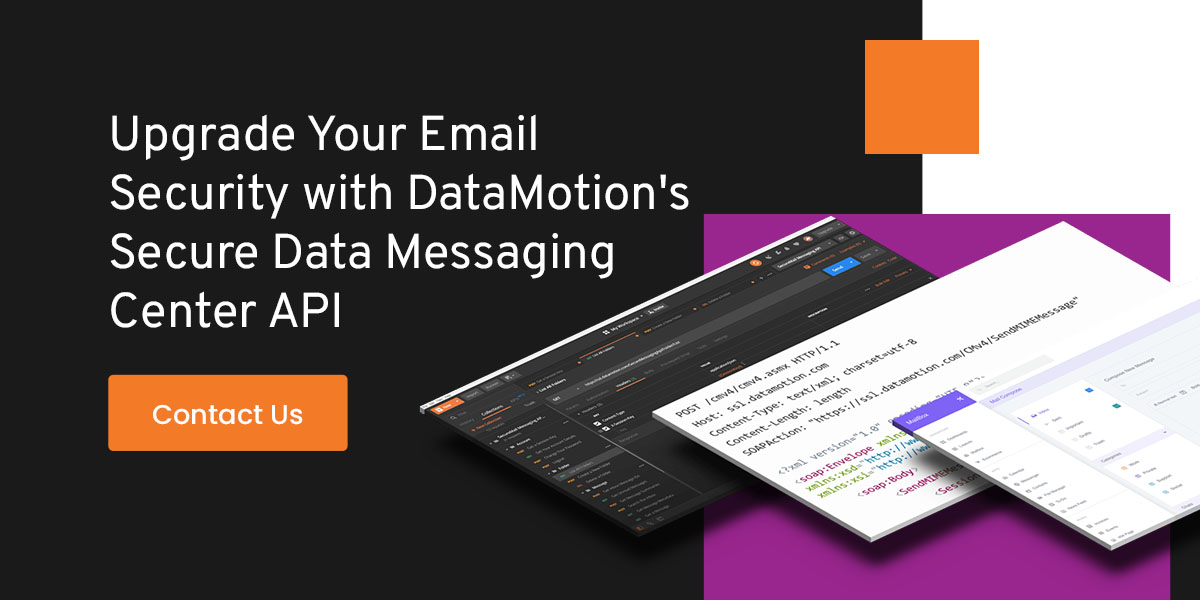
Upgrade Your Email Security with DataMotion’s Secure Message Center API
Invest in better, scalable email security with DataMotion’s secure message center API. If you’re looking for a robust, customizable and enhanced-control solution for email encryption software, trust our expert services every time.
Our API offers state-of-the-art encryption algorithms, automated key management and a user-friendly interface that makes secure messaging a breeze for you and your customers. With our commitment to certification and compliance, you can trust that your sensitive data will remain secure, meeting regulatory requirements.
Don’t compromise on email security. Reach out to us today and experience the benefits of our trusted security solutions today!




